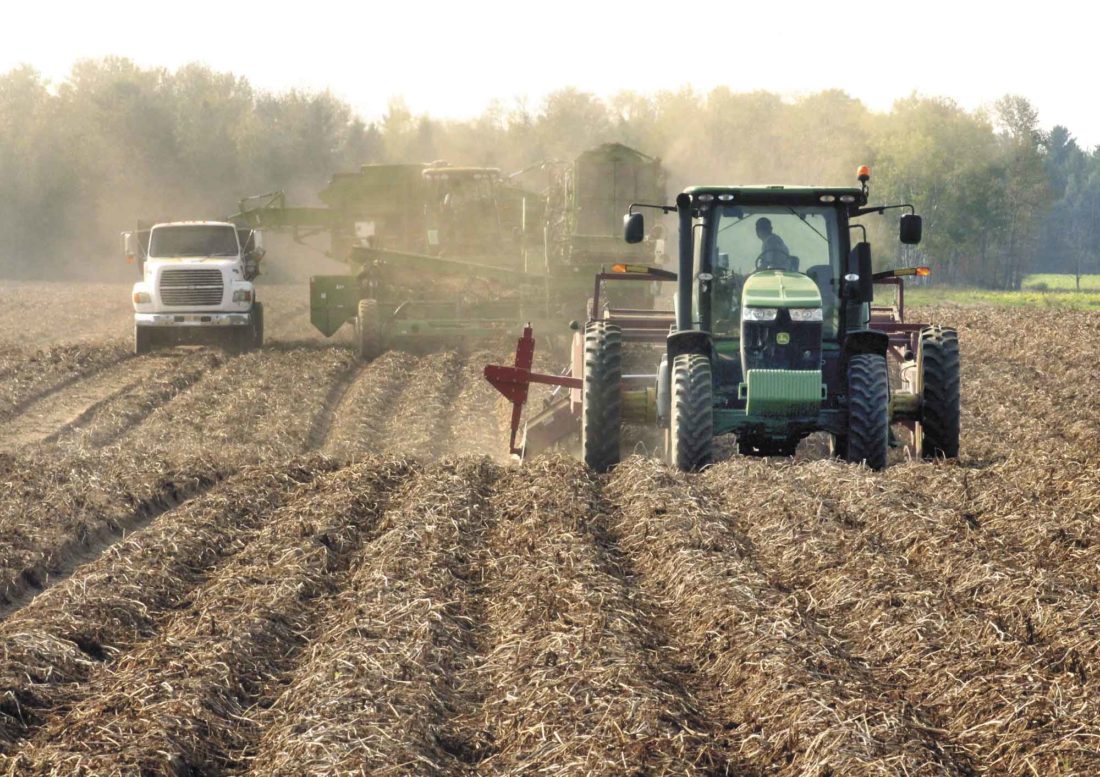The weather made for a strange growing season for at least one Michigan potato grower. The wet spring delayed planting by about 10 days, pushing back completion to June 23, the latest finish date 53-year-old Dale Johnson can remember in a lifetime working with potatoes.
Then the Sagola area farm had to break off from harvesting last weekend when temperatures soared—again, far later in the year than Johnson can recall.
Weather dictates when potatoes can come out of the ground, Johnson explainsToo warm, as happened last weekend, and the piles of potatoes can spoil soon after harvest. A frosty morning, however, means waiting until there’s no danger of damage from the cold, he says.
 The normal temperatures for this time of year—highs in the 60s; lows in the 40s—are ideal for gathering up the season’s potato crop, which despite the late start and losing about 2 percent of their 295-acre planting “as a whole is quite nice,” Johnson says. Even when a step behind, too, they can catch up quickly thanks to a new harvester they’ve had for about four years, he says
The normal temperatures for this time of year—highs in the 60s; lows in the 40s—are ideal for gathering up the season’s potato crop, which despite the late start and losing about 2 percent of their 295-acre planting “as a whole is quite nice,” Johnson says. Even when a step behind, too, they can catch up quickly thanks to a new harvester they’ve had for about four years, he says
Dale Johnson’s great-grandfather, Martin, first started the potato operation in 1931. Five of his six sons would go on to be part of the business. His grandfather, Elmer, died in 1969, but his father, Melvin—the farm now bears his name—still works “every day,” says Dale.
Along with Dale and his father, the potato operation includes his older brother, Rodney Johnson, and three of his brother’s children: Jason and David Johnson and Faith Kuzak, along with her husband, John.
They mostly raise seed potatoes, primarily for Wisconsin and Minnesota as well as downstate Michigan, Dale Johnson said. They also provide some for sale in such stores as Krogers and Costco, as well as smaller grocers.
Once the crop is safely in, the family will spend much of the winter in the warehouse, grading the roughly 11 million to 11.5 million pounds of potatoes, each one of which has to be individually evaluated, Johnson says.
The amount of work involved in the business, plus fluctuating prices, might be reasons potato farming has declined in Michigan, he says. When Johnson graduated from high school in the early 1980s, the state had 580 growers. Now, only 90 remain, and the Upper Peninsula’s potato grower population has dwindled to 11. Four, including the Johnsons, are in Dickinson County.
“To lose that many, it’s unbelievable,” Johnson says.
Yet his family has no plans for now to abandon the crop that has been their staple for so long.
“It was a challenging year,” Johnson says, “but if we can get them out of the ground, we’ll consider it a blessing.”
Source: The Daily News